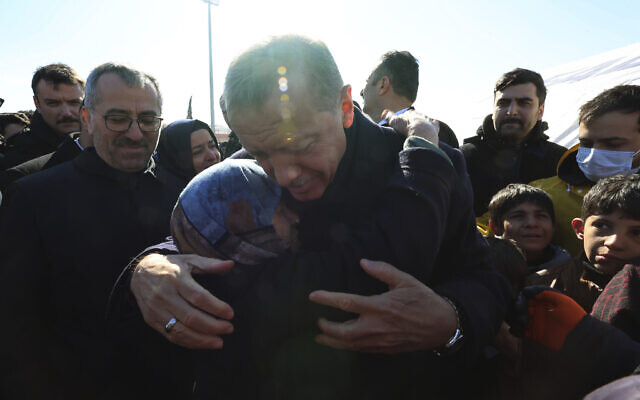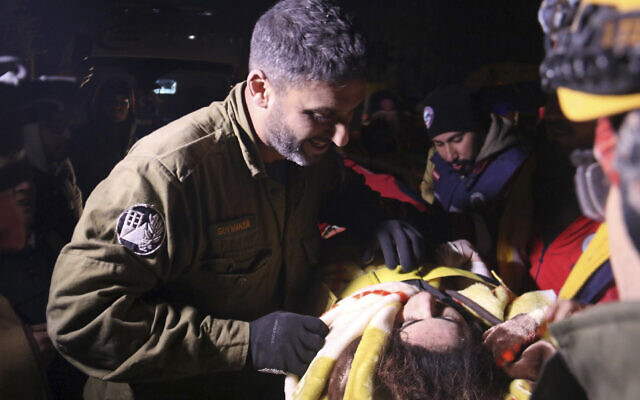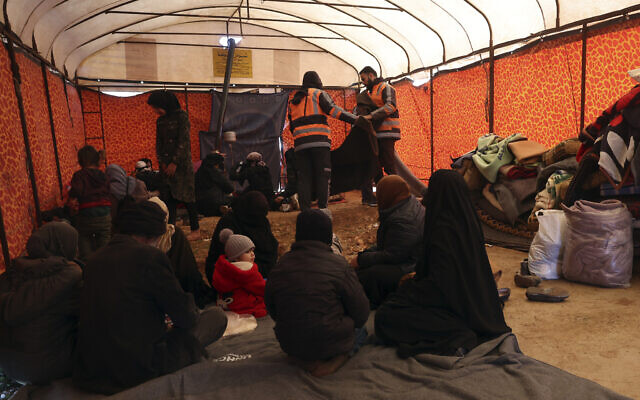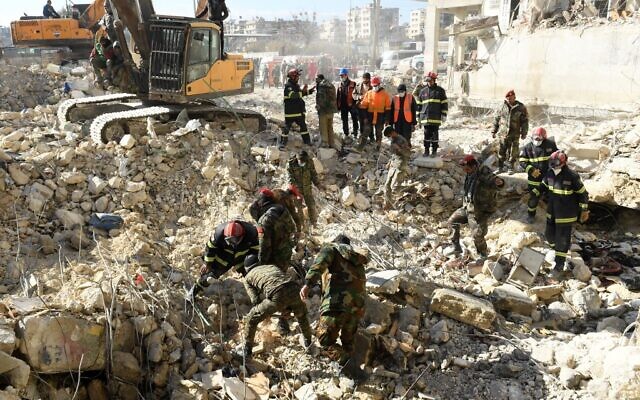ANTAKYA, Turkey — Turkish President Recep Tayyip Erdogan on Wednesday conceded “shortcomings” after criticism of his government’s response to the massive earthquake that killed over 11,700 people in Turkey and Syria.
The sprawling scale of the disaster that flattened thousands of buildings, trapping an unknown number of people, has swamped relief operations already hampered by freezing weather.
Survivors have been left to scramble for food and shelter — and in some cases watch helplessly as their relatives called for rescue, and eventually went silent under the debris.
“My nephew, my sister-in-law and my sister-in-law’s sister are in the ruins. They are trapped under the ruins and there is no sign of life,” said Semire Coban, a kindergarten teacher, in Turkey’s Hatay.
“We can’t reach them. We are trying to talk to them, but they are not responding… We are waiting for help. It has been 48 hours now,” she said.
Get The Times of Israel's Daily Edition by email and never miss our top stories
Still, searchers kept pulling survivors from the debris three days after the 7.8 magnitude quake that is already one of the deadliest this century, even as the death toll continues to rise.
As criticism mounted online, Erdogan visited the especially hard-hit Hatay province, where more than 3,300 people died and entire neighborhoods were destroyed. Residents there have criticized the government’s response, saying rescuers were slow to arrive.

Turkey’s President Recep Tayyip Erdogan and a survivor hug each other as he visits the city center destroyed by an earthquake in Kahramanmaras, southern Turkey, February 8, 2023. (Turkish Presidency via AP )
Erdogan, who faces a tough battle for reelection in May, acknowledged “shortcomings” in the response to Monday’s 7.8 magnitude quake but said the winter weather had been a factor. The earthquake destroyed the runway at Hatay’s airport, further disrupting the response.
“It is not possible to be prepared for such a disaster,” Erdogan said. “We will not leave any of our citizens uncared for.” He also hit back at critics, saying ”dishonorable people” were spreading “lies and slander” about the government’s response.
Twitter was also not working on Turkish mobile networks, according to AFP journalists and the NetBlocks web monitoring group.
Children saved
The window for rescuers to find survivors is narrowing as the effort nears the 72-hour mark that disaster experts consider the most likely period to save lives.
Yet on Wednesday, rescuers pulled children from under a collapsed building in the hard-hit Turkish province of Hatay, where whole stretches of towns have been leveled.
“All of a sudden we heard voices and thanks to the excavator… immediately we heard the voices of three people at the same time,” said rescuer Alperen Cetinkaya.
“We are expecting more of them… the chances of getting people out of here alive are very high,” he added.
An Israeli rescue delegation that arrived in Turkey has also had success in saving some people.

Emergency workers rescue a young Turkish girl, in Kahramanmaras, southern Turkey, February 8, 2023. (IHA via AP)
Unidentified bodies were to be buried within five days after being photographed and undergoing DNA tests and fingerprinting, Turkey’s disaster management agency said. Islamic funeral rites prescribe quick burial.
Officials and medics said 9,057 people had died in Turkey and 2,662 in Syria from Monday’s 7.8-magnitude tremor, bringing the total to 11,719 — but that could yet double if the worst fears of experts are realized.
The World Health Organization chief Tedros Adhanom Ghebreyesus has warned that time was running out for the thousands injured and those still feared trapped.
Many of those who survived the earthquake lost their homes and were forced to sleep in cars, in government shelters, or outdoors amid rain and snowfall in some areas.
“We don’t have a tent, we don’t have a heating stove, we don’t have anything. Our children are in bad shape,” Aysan Kurt, 27, said. “We did not die from hunger or the earthquake, but we will die freezing from the cold.”
The disaster comes at a sensitive time for Erdogan, who faces an economic downturn and high inflation. Perceptions that his government mismanaged the crisis could hurt his standing.
On his tour of hard-hit areas, he said the government would distribute 10,000 Turkish lira ($532) to affected families.
Kemal Kilicdaroglu, the leader of Turkey’s main opposition party, blamed the devastation on Erdogan’s two-decade rule, saying he had not prepared the country for a disaster and accusing him of misspending funds.
‘People dying every second’
In Syria, aid efforts have been hampered by the ongoing war and the isolation of the rebel-held region along the border, which is surrounded by Russia-backed government forces. Syria itself is an international pariah under Western sanctions linked to the war.
Due to the scale of the damage and the lack of help coming to certain areas, survivors said they felt alone in responding to the disaster.
“Even the buildings that haven’t collapsed were severely damaged. There are now more people under the rubble than those above it,” a resident named Hassan, who did not provide his full name, said in the rebel-held town of Jindayris.
“There are around 400-500 people trapped under each collapsed building, with only 10 people trying to pull them out. And there is no machinery,” he added.

Families who lost their homes in a devastating earthquake in Syria sit inside a tent that an NGO set up to provide them shelter and food in the town of Harem near the Turkish border, Idlib province, Syria, February 8, 2023. (Ghaith Alsayed/AP)
The White Helmets, leading efforts to rescue people buried under rubble in rebel-held areas of Syria, have appealed for international help in their “race against time.”
They have been toiling since the quake to pull survivors out from under the debris of dozens of flattened buildings in northwestern areas of war-torn Syria that remain outside the government’s control.
“International rescue teams must come into our region,” said Mohammed Shibli, a spokesperson for the group known formally as the Syria Civil Defence.
“People are dying every second; we are in a race against time,” he told AFP from neighboring Turkey.
Syria appeals for EU help
The issue of aid to Syria was a delicate one, and the sanctioned government in Damascus made an official plea to the European Union for help, the bloc’s commissioner for crisis management Janez Lenarcic said.
A decade of civil war and Syrian-Russian aerial bombardment had already destroyed hospitals, collapsed the economy, and prompted electricity, fuel, and water shortages.
The European Commission is “encouraging” EU member countries to respond to Syria’s request for medical supplies and food while monitoring to ensure that any aid “is not diverted” by President Bashar al-Assad’s government, Lenarcic noted.
Dozens of nations, including the United States, China and the Gulf States have pledged to help, and search teams as well as relief supplies have already arrived. Israel is also set to send aid to Syria in the form of tents, blankets, and medicines. Syria made a request via Russia for aid from its neighbor Israel, despite the two countries being officially at war.
A winter storm has compounded the misery by rendering many roads — some of them damaged by the quake — almost impassable, resulting in traffic jams that stretch for kilometers in some regions.
The European Union was swift to dispatch rescue teams to Turkey after the massive earthquake struck the country on Monday close to the border with Syria.
But it initially offered only minimal assistance to Syria through existing humanitarian programs, because of EU sanctions imposed since 2011 on Assad’s government over its brutal crackdown on protesters that spiraled into a civil war.

Algerian rescue teams take part in the search and rescue operations following an earthquake in Syria’s northern city of Aleppo on February 8, 2023. (Photo by AFP)
The UN humanitarian coordinator for Syria, Muhannad Hadi, said Wednesday that there was still no access to the Bab al-Hawa border crossing into rebel-held Syria, the only terminal where UN aid can be delivered, because of damaged roads.
Using other crossings, or sending the aid across conflict lines from Damascus, requires “multiple levels of coordination between different parties, security, humanitarian, NGOs,” he said. “It’s not a straightforward operation.”
Critics have accused the Syrian government of deliberately slowing down the process because it does not recognize aid groups operating in rebel-held areas and has sought to cut off support for those areas throughout the conflict.
The Turkey-Syria border is one of the world’s most active earthquake zones.
Monday’s earthquake was the largest Turkey has seen since 1939, when 33,000 people died in the eastern Erzincan province.
In 1999, a 7.4 magnitude earthquake killed more than 17,000.
Times of Israel staff contributed to this report.


